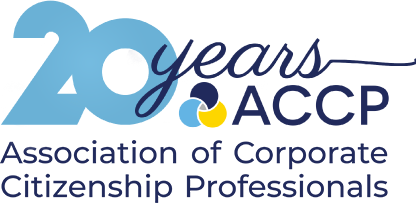Chief Impact Officer
The opportunity has never been greater for CSR professionals to relay the business and social outcomes of their work with key internal and external stakeholders. While corporate purpose initiatives have gained widespread acceptance, the remainder of 2025 represents a pivotal moment where demonstration of value becomes paramount. Success now requires moving beyond program implementation to measurable proof of impact—both for communities served and organizational objectives achieved.
According to recent research from Benevity’s State of Corporate Purpose 2025, 92% of leaders are investing in corporate purpose because it’s beneficial for business, while 88% believe their impact strategy is future-proofing their organization. These numbers tell a compelling story: Purpose-driven initiatives are no longer just moral imperatives; they’re strategic business decisions that require the same rigor and accountability as any other corporate function.
Corporate citizenship professionals face a unique opportunity. More than ever, they must do two critical things simultaneously: connect corporate purpose with measurable community impact and link that impact back to the company’s success. This dual responsibility demands a new level of sophistication in how CSR professionals approach, measure, and communicate their work.
While social impact teams remain lean—with the median team size in a company of 10,000-50,000 employees typically consisting of around four people—these professionals are proving that impact isn’t about headcount, but rather about strategic focus. These small but mighty teams are successfully managing complex programs, responding to ongoing crises, and demonstrating measurable value to both communities and shareholders. Their effectiveness lies in their deep commitment, cross-functional collaboration, and innovative approaches that maximize every resource and relationship.
The following are five strategies that will help CSR teams demonstrate accountability and authenticity in 2025.
Focus on Place-Based Analytics
CSR programs that are poised for the most success will concentrate on specific geographic communities where they operate, embracing the “Think Global, Act Local” philosophy, which recognizes how universal challenges manifest differently across regions. Place-based analytics enable companies to understand local needs, track community-level changes, and demonstrate a genuine connection to the places they call home. For example, while housing affordability represents a global issue, successful CSR programs partner with location-specific organizations and tailor solutions to address distinct regional barriers—whether that’s zoning restrictions in urban markets or infrastructure gaps in rural communities. This approach transforms CSR from a broad corporate initiative into targeted community investment with clear, measurable outcomes.
Cross-Functionally Collaborate
Successful CSR programs in 2025 require breaking down organizational silos and working strategically across departments, highlighting the critical need for CSR teams to collaborate with HR, Finance, and other departments to address fundamental employee needs first.
Emergency Financial Relief programs exemplify this cross-functional approach perfectly. By partnering with HR teams, CSR leaders can implement initiatives that serve dual purposes: supporting employees during crisis moments while strengthening retention and productivity metrics. Research shows that employee financial stress costs employers an average of $5,000 per employee, per year, in lost productivity, making these collaborative programs clear business imperatives. When employees feel financially secure, they become more engaged in broader community impact initiatives, creating measurable value streams that benefit both internal stakeholders and external communities.
Strengthen Climate-Action Assessments
Environmental responsibility remains a top priority for stakeholders; however, 2025 demands more sophisticated measurement of climate action. This means moving beyond carbon offset purchases to comprehensive assessments that include the impact on the supply chain, community resilience building, and long-term environmental justice considerations. Robust climate assessments provide the data necessary to make meaningful progress and communicate authentic environmental leadership.
Implement Standardized and Equitable Metrics
The CSR field has been working diligently over the past few years to establish more consistent standards and metrics for success. Successful teams will adopt standardized metrics that allow for meaningful comparison and tracking over time, while ensuring these metrics capture equitable outcomes across different communities and demographics. The metrics should relay not only the social impacts, but also the business correlation and success. This standardization enables more effective storytelling and fosters credibility with[DR1] stakeholders.
Leverage AI for Social Impact Measurement
Artificial Intelligence (AI) offers unprecedented opportunities to enhance impact measurement and reporting. By analyzing social media sentiment in communities where companies operate and processing vast amounts of program data for insights, AI can help small CSR teams conduct more sophisticated analysis than ever before. The key is using these tools to augment human judgment, not replace the relationship-building that remains central to effective community engagement.
The data reinforces what many of us already suspected: despite concerns about polarized giving, 96% of donations on platforms like Benevity support universally agreed-upon causes, such as hunger relief, education, and healthcare. This suggests that, while the political landscape may feel divided, there is a remarkable consensus around fundamental human needs, providing a stable foundation for corporate citizenship efforts.
Perhaps most encouraging is that 62% of impact leaders are increasing investment in impact data, measurement, and reporting. This trend signals growing recognition that demonstrating CSR value isn’t just about compliance, it’s about building the credibility and trust that enables sustainable impact over time.
The continued evolution of CSR is accelerating. The continued evolution of CSR is accelerating. The companies that will thrive are those that embrace this transformation,investing in the systems, people, and partnerships necessary to create measurable impact while building authentic community relationships.
It’s important to remember that accountability and authenticity aren’t competing priorities; they’re complementary strengths that, when combined effectively, create the foundation for corporate citizenship that becomes a driving force for meaningful change.

